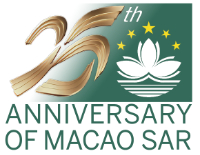Chief executive: Non-gaming sector accounts for over 60% of SAR's GDP
Macao is no longer a city driven primarily by its casino gaming industry, as the special administrative region is making efforts to diversify its industrial structure to reduce reliance on a single industry, said Ho Iat-seng, chief executive of the Macao SAR, who will complete his term at the end of this month.
Last year, the gaming industry recovered to about 75 percent of its 2019 level and, yet, it accounted for only 37.2 percent of Macao's GDP, while the non-gaming sector exceeded 60 percent, Ho told China Daily in a recent interview. "It means that we're shifting away from a gaming-dominated economy," he said.
 Ho, who took office in December 2019, made the promotion of economic diversification a top priority in governance during his five-year tenure, as the city realized the risks associated with relying on a single industry.
Ho, who took office in December 2019, made the promotion of economic diversification a top priority in governance during his five-year tenure, as the city realized the risks associated with relying on a single industry.
"Macao is a very small city, and due to historical reasons, the economy has been predominantly driven by the gaming industry. In the face of uncertainties, such as the pandemic, our economic structure found it difficult to withstand risks," he said.
Following the revision of gaming laws in 2022 to better regulate the industry, Macao's casino operators committed to investing a total of 118.8 billion Macao patacas ($14.8 billion) over 10 years, with the investment in non-gaming projects being 10 times that in gaming projects. The objective aims to support the diversification of Macao's economy, Ho said.
READ MORE: Upholding 'one country, two systems' seen as key to Macao's prosperity
A formal plan for Macao's economic diversification from 2024 through 2028 — the first such systematic industrial development plan in the city — was issued in November 2023. The goal is to allow the non-gaming sector to contribute about 60 percent of GDP until 2028, while the gaming industry continues to recover from the impact of COVID-19.
The document outlines specific plans and arrangements for sectors that Macao will focus on, including tourism and leisure, traditional Chinese medicine and healthcare, modern finance, new and high technologies, and conventions and exhibitions.
Ho said the SAR government is also promoting the development of performing arts, which has not only strengthened the hospitality industry, but also certain segments of the casino gaming industry.
"Many international performers enjoy participating in shows in Macao. We are committed to showcasing the city's unique charm, which includes the blend of Chinese and Western cultures, the rich cuisine, and more. We encourage visitors to delve deeper to understand Macao, and not just see it as a destination for casino gaming," he said.
The pandemic was among the greatest challenges for Macao since its return to the motherland 25 years ago. Although the city grappled with one of the most severe impacts of COVID-19, which involved three years of Ho's five-year tenure, the SAR government maintained stability and ensured people's livelihoods.
Every permanent resident of the city was made eligible to receive an annual cash handout of 10,000 Macao patacas, boosting the SAR's overall economic recovery, Ho said.
He noted that significant efforts have been made to advance the city's infrastructure development. For example, the construction of the Macao Medical Center of the Peking Union Medical College Hospital, an elite healthcare facility on the Chinese mainland. The Macao Medical Center started trial operation last year, aiming to improve the level of critical care treatment in the city.
ALSO READ: Macao SAR bolsters role as bridge, trade hub
"The 'one country, two systems' policy gives Macao a high degree of autonomy. With the strong backing of the central government, Macao managed to overcome three years of pandemic, while also promoting economic development," he said.
In the future, Macao will continue to leverage its unique advantage as a platform for cooperation between China and Portuguese-speaking countries, and make greater contributions to promoting the country's high-level opening-up, Ho said.
Macao's history of over 400 years under Portuguese administration has enabled it to play a unique role, with advantages including the availability of talent familiar with the Portuguese language and Portuguese laws, Ho said.
Macao invites people from Portuguese-speaking nations, especially those with connections to the city, as well as their descendants, to visit, understand its development, and use their voices to tell the stories of China and the SAR, he added.
Contact the writers at zhangyi1@chinadaily.com.cn


